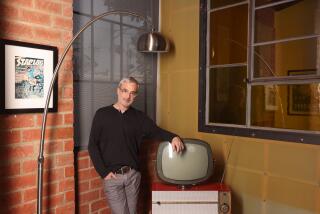During Trumpâs present, itâs hard to write the future, says science fiction writer John Scalzi

Here is a very real and true thing: 2017 is making it really hard to be a science fiction writer.
To be sure, these times â by which I mean the Trump era to date, letâs go ahead and avoid cutesy winking allusions â are making it hard for lots of writers, not just the ones who write science fiction. Itâs difficult to focus on writing, particularly fiction, when the world feels like itâs on fire and everyone you know is trying to decide between hiding in a hole or taking up recreational alcoholism to get by.
The rapid-fire pace of events is such that you (or at least I) end up sitting at the computer sort of paralyzed. In the last few weeks weâve had (in no particular order) the healthcare vote, hurricane Scaramucci, North Korea and racists marching with Tiki torches like the domestic terrorists they are. One straight up ran a car into a crowd, and the president bent over backward to say somehow everyoneâs at fault for that one. Youâre worried that if you get up to have a snack by the time you get back weâll have declared war on, oh, I donât know, Venezuela, which by the way we apparently almost kinda did. That anyone gets anything done these days is a minor miracle, snuggled deep inside the larger miracle that in fact we are all still here.
But as a science fiction writer, things are even more complicated.
Trade secret here: Science fiction is commonly considered the literature of the future, but more often than not itâs about today. Yes, the events that take place in it (usually) happen in the future, and often feature technology or characters that donât exist. We donât have warp engines or transporters or aliens or robots that have learned to love, no matter how fond you are of Siri.
The world is never not catching up with science fiction, for better or worse.
The thing is, science fiction has its setting in the future, but the people writing it and reading it live now, and the stories theyâre writing and reading reflect the hopes and fears of whatever age the story is written in. Thereâs a reason science fiction literature of the late â60s and early â70s was about overpopulation, why in the â80s cyberpunk reflected the uncertainty about the accelerating computerization of our world, and why much of the best science fiction of the last decade, from Paolo Bacigalupiâs âThe Windup Girlâ to N.K. Jemisinâs âThe Fifth Season,â is rooted in ecological disaster. Science fiction sees the world today and speculates out from there.
The secret, however, is to come at it from an angle. Thereâs a thin line between using contemporary themes to extrapolate from and entertain readers, and stepping up on a soapbox and using a political agenda to cudgel people. The least successful science fiction to me is the stuff that takes todayâs political catfights and dumps it uncut into the deep future, hundreds if not thousands of years in the future. To have characters in far-flung times prattling on about issues clearly specific to our time would be like writing a novel where people in 2017 are having knock-down, drag-out fights about the Alien and Sedition Acts or the Boer War. Better that science fiction breathes life into todayâs anxieties and aspirations in more clever and possibly subtler ways.
But nothing about our days today is subtle, and the challenge of making science fiction not seem like a bald ripoff of current headlines is much more of a task than itâs been in a while. As an example, the book Iâm currently writing, âHead On,â has as a plot point millions of American citizens losing their healthcare and the government subsidies that allow them to get through life, and the panic that sets in for these folks when they have to scramble to stay healthy. Sound familiar? It should; millions of Americans kept access to their healthcare by a single senatorial vote just a few weeks back.
This plot line in âHead Onâ wasnât thought up a few weeks ago; I did the basic outline of the novel in early 2016, when the idea of millions of people losing their healthcare was theoretical at best rather than one vote away from reality. When the book comes out next April, no one will believe that the healthcare scramble in my book isnât a direct and obvious editorial comment on the healthcare high jinks of this year; thatâs going to have an effect on how itâs approached and reviewed, and, possibly, on who ultimately decides to buy it.
Itâs difficult to focus on writing, particularly fiction, when the world feels like itâs on fire.
And itâs not just me: How do science fiction writers trying to build dystopias in their fiction compete with a real world where the United States government is actively denying climate change and threatening nuclear exchanges, where white nationalists stalk the halls of the White House and the president might be compromised by a foreign power? How does any science fiction writer finesse that one?
Nor is it just literary science fiction â after the spectacle of Confederate flags and Nazi flags being carried side by side in Charlottesville, Va., and hundreds of angry white manboys glorying in their racism, does HBO really need âConfederate,â a show that posits a world in which the South won the Civil War? What weâve got going on right now is hard to top.
The world is never not catching up with science fiction, for better or worse. But right now it would make my job easier in all sorts of ways if the world could just maybe take a break, catch its breath and have a snack before it continues its wild hurtle toward â well, wherever the hell weâre going in these ridiculous times. Then I could get back to writing work thatâs minimally allegorical and not, intentionally or otherwise, something that looks like straight-up reportage.
Scalzi, a critic at large, is a Hugo Award-winning novelist. His most recent book is âThe Collapsing Empire.â
ALSO
Michael Hiltzik: Trump has become so toxic, CEOs are abandoning him in droves
More to Read
Sign up for our Book Club newsletter
Get the latest news, events and more from the Los Angeles Times Book Club, and help us get L.A. reading and talking.
You may occasionally receive promotional content from the Los Angeles Times.











